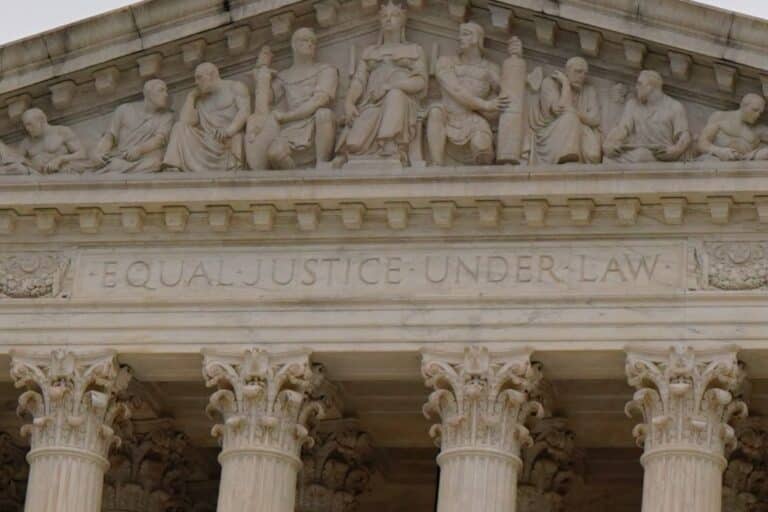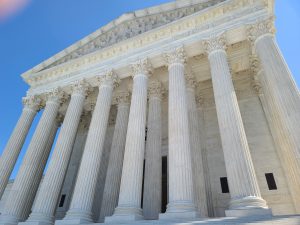The Supreme Court declined to take up an emergency request to block an Illinois city’s “assault weapons” ban on Thursday.
That’s the fourth emergency request from gun-rights plaintiffs the Court has denied. At the same time, it has acted on two emergency requests by the federal government to intervene in a gun case.
So, what can we make of that?
One thing it doesn’t tell us is how the Court will ultimately come down on the merits of each case. It likely doesn’t mean the Supreme Court is going to approve of bans on popular firearms like the AR-15 or home gun building or the myriad of new gun-free zones instituted by the same states the Court just rebuked last year.
One takeaway, though, is the Court is pretty conservative in the non-ideological sense. It seems more inclined to allow the government leeway in enforcing gun restrictions as the cases against them unfold than it is to short-circuit the legal process in favor of plaintiffs. It appears to trust the government when it warns that not intervening against lower court injunctions could do more to upend things around the country than plaintiffs’ warnings that not issuing injunctions denied by lower courts does the same thing.
So, the Court trusts the government more when it comes to taking emergency action on guns. That’s probably a concerning development for gun-rights advocates. It may even lead some to conclude the Court has changed its mind on the Second Amendment.
After all, it was just last year SCOTUS handed down a landmark decision in New York State Rifle and Pistol Association v. Bruen. That ruling declared public gun carry a protected right and set a new test for determining if a gun restriction is constitutional. The test centered around whether the regulation fits in a historical tradition that dates back to the Founding Era, something most scholars view as a very high bar.
But when New York instituted a law with the net effect of making it more difficult to legally carry a gun than the one the Court struck down, it declined to act on an emergency basis after the Second Circuit Court of Appeals stayed a lower court ruling against the law–effectively letting it go into effect. It did the same thing regarding aspects of the New York law that restrict gun sales. Then, it refused to issue an emergency injunction against Naperville, Illinois, after a lower court upheld its AR-15 ban. Now, it’s done it again after a Seventh Circuit panel also upheld the ban.
The Department of Justice and ATF have faired much better on the emergency docket. In August, the Supreme Court issued an emergency stay on US District Judge Reed O’Connor’s decision to block enforcement of the ATF’s “ghost gun” ban despite a Fifth Circuit panel declining to do so. After Judge O’Connor issued another, more limited injunction, SCOTUS intervened to stay that one too.
Beyond its actions, the Court has given us little to go off of in understanding its thinking.
Only two of the decisions gave us any written indication of why the Court has taken this path. The first is relatively small. In the ghost gun case, SCOTUS set its stay to last until it decides whether to take up the case once the inevitable appeal reaches that point in the process.
That suggests the Court wants the normal legal process to play itself out.
The second written opinion is a bit more extensive. Justices Samuel Alito and Clarence Thomas wrote a concurrence in the New York gun-free zone case explaining some of their reasoning. And it also indicates there’s a uniform desire to let the lower courts fully process these cases.
“I understand the Court’s denial today to reflect respect for the Second Circuit’s procedures in managing its own docket, rather than expressing any view on the merits of the case,” Alito wrote in Antonyuk v. Nigrelli.
The pair said the case involves unique concerns that arise from the implications of the recent Bruen ruling. That indicates they may want the lower courts to develop a complete record before it ultimately considers the merits.
“The New York law at issue in this application presents novel and serious questions under both the First and the Second Amendments,” Alito wrote. “The District Court found, in a thorough opinion, that the applicants were likely to succeed on a number of their claims, and it issued a preliminary injunction as to twelve provisions of the challenged law.”
It’s important to note that, unlike in the years after its landmark Heller ruling, the Court isn’t avoiding Second Amendment cases. It just heard oral arguments in United States v. Rahimi, which deals with the federal prohibition against people subject to domestic violence restraining orders owning guns. And those oral arguments suggest the Court will probably take up the other two cases on who can be barred from owning a firearm that are currently pending before it.
Still, the most convincing evidence the Supreme Court hasn’t changed course on the Second Amendment is actually its silence.
So far in these emergency requests, Alito and Thomas are the only justices to say anything about any of the cases. And their message was that the injunction against New York’s law was “thorough.” None of the justices have spoken out to defend the ATF’s ghost gun ban.
More importantly, none of the justices have spoken out to complain the Court isn’t performing its duty to protect the Second Amendment. That’s the strongest indicator there probably hasn’t been much concrete movement on how a majority of justices are likely to view the Second Amendment. While it’s tough for outsiders to know for sure which way the Court is leaning at any given time on any given issue, it’s a bit easier for the justices themselves to have a feel for it.
That Alito and Thomas haven’t voiced any concerns about the Court’s lack of emergency Second Amendment action says a lot. After all, one of the most common opinions you saw on the Second Amendment before Bruen was the insistence, especially from Thomas, that the Court was treating it as a second-class right because it wasn’t taking up cases. He even featured that point in complaints about how lower courts had interpreted the amendment when writing Bruen.
It’s certainly possible there aren’t five votes against an AR-15 ban, ghost gun ban, or expansive gun-free zones–even if Bruen seems to imply otherwise. Perhaps some justices have even rethought their position on the Second Amendment post-Bruen. But there isn’t much hard evidence of that yet.
If Thomas or Alito start issuing dissents alongside these denials, especially ones that argue the Court has begun treating the Second Amendment as a second-class right, that’s when gun-rights proponents should really start to worry about the bigger picture. Of course, that’s a small comfort for those living under restrictions they consider unconstitutional in the meantime.







3 Responses
I am disappointed with the approach SCOTUS is taking for the following reasons. Given the crawl to finality, the plaintiff’s survival will likely result in that business being long-shuttered and lives inexorably altered when a final decision is rendered. The rights of Illinoisans were harmed, and Illinoisans were turned into potential felons unless they admitted private information to Illinois that may or may not have 5th Amendment ramifications. If the law is overturned, can those actions ever be satisfactorily undone… I think not.
The shenanigans being played out in the inferior court, like Miller v Bonta in the 9th circuit, make my blood boil. Californians have had their rights infringed since 1989, and 34 years later, it’s still a denied right. Will that be what happens in Illinois? While I accept the difficulty of acting on incomplete data sets, SCOTUS dissents like IMO options that have failed the constitution and all 2a supporting Americans.
I think this is a common and understandable reaction a lot of gun-rights supporters are going to have to the Court letting some of these lower court opinions stand for now. There are very real-world consequences for waiting on these cases to come up through normal order after Bruen. I can’t say for sure why the justices pick and choose the cases to intervene in on an emergency basis. It seems they don’t feel the same sort of urgency as those impacted by these laws do.
But that’s not terribly unusual with courts. Things move much slower than what plaintiffs and their supporters want in most situations. The justices may also not want to get ahead of themselves on Second Amendment jurisprudence since they are currently deciding Rahimi and will probably decide Range and Daniels soon too. Maybe they want to wait for that aspect of gun rights to get figured out before moving on to another?
Of course, I can’t say for sure because they aren’t very open about their deliberative process outside of oral arguments and what ends up in the opinions.
I’m more willing to say this doesn’t necessarily mean the Court will uphold these gun restrictions once they do take them on the merits, though. In fact, I think it’s much more likely it won’t given what six justices agreed to in Bruen. But the Court only appears willing to do that in normal order for now.
A right delayed is a right denied.
Leaving aside that the Bill of Rights’ purpose is supposed to limit government’s actions and not citizen’s, there aren’t any other enumerated rights that require citizens to seek government permission to exercise them. The 2nd Amendment is the only one that is treated as an exception.
There were two components of the original Constitution the Founders put in place to limit the power and reach of the federal government, they prohibited an income tax so as to limit the size of the government, and they recognized the power of an armed populace keep the government in check as a last resort. A previous generation of Americans disregarded the Founders warning and gave the Government almost unlimited power when they passed the 16th Amendment; and now the 2nd Amendment is treated as though it’s a privilege granted to us by the government.
“The Establishment” (including SCOTUS) distrusts the average citizen. They do everything they can to ensure the balance of power stays firmly with them.